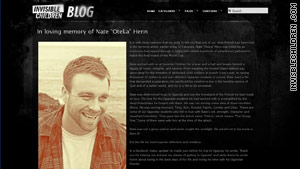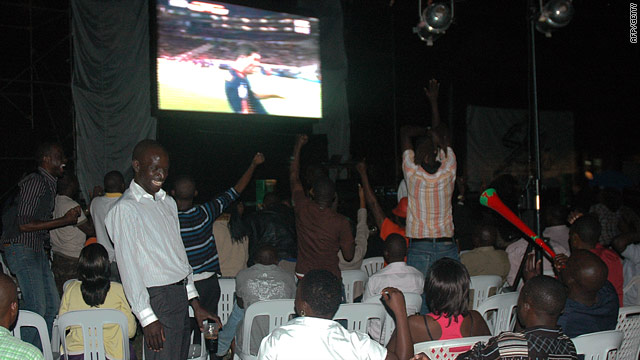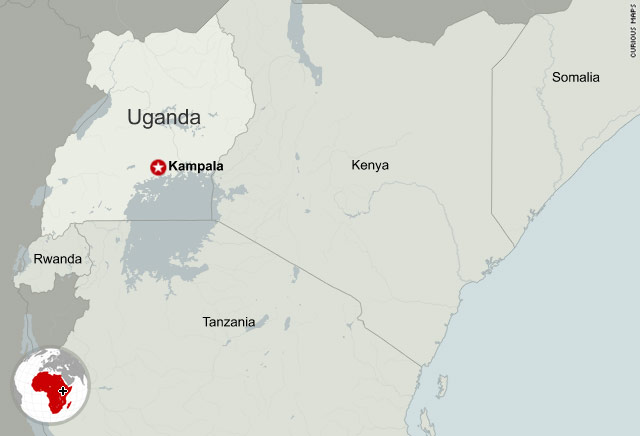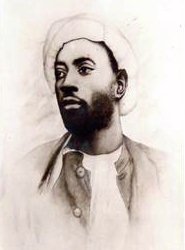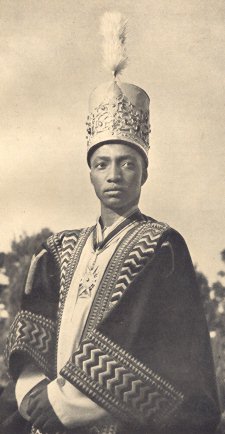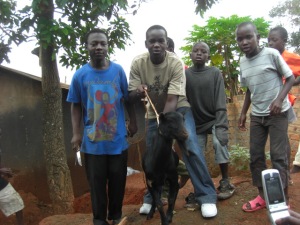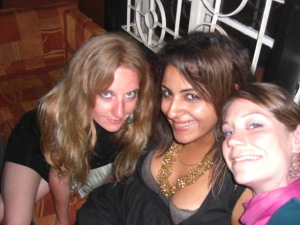People
watch the World Cup final at a restaurant in Kampala late on July 11,
moments before blasts tore through the crowds.
STORY HIGHLIGHTS
- NEW:
Al-Shabaab says it is waging war against "collaborators"
- NEW:
Ugandan president declares week of mourning for victims
- Death
toll from Uganda bombings at 74
- Group: American killed was
working with students
A Somali Islamist militant movement on Monday
claimed responsibility for a trio of bombings that killed at least 74
people Sunday in the Ugandan capital.
"And the best of men have
promised and they have delivered," said an Arabic statement issued by
Al-Shabaab's press office and obtained by CNN. "Blessed and exalted
among men -- (taking) full responsibility ...We wage war against the
6,000 collaborators; they have received their response."
The
6,000 is an apparent reference to African Union peacekeepers in Somalia.
Uganda contributes troops to the peacekeeping effort.
Earlier
Monday, Sheikh Abu Al Zubeir, identified as "the Emir of Al-Shabaab in
Somalia," said in an Arabic website posting, "My message to the Ugandan
and Burundian nations is that you will be the target for our retribution
to the massacres perpetrated against the Somali men, women and children
in Mogadishu by your forces." The statement was posted on an al-Qaeda
affiliated website which previously has carried statements and videos
from Al-Shabaab.
The website set up a page Monday to "receive
congratulations" on Al-Shabaab's behalf for the "blessed operations" in
Uganda.
The three explosions ripped through two Kampala, Uganda,
venues where crowds were watching the World Cup final match on Sunday.
Suspicion had centered on Somali Islamist groups shortly after the
incident. Islamic militants battling Somalia's U.N.-backed transitional
government had previously threatened attacks on Uganda and Burundi,
which also contributes troops to the peacekeeping effort in Somalia.
President Yoweri Museveni declared a week of national mourning for
victims of the bombings, beginning Tuesday, according to a government
statement. All flags on public buildings will be lowered to half-staff
during the mourning period, the statement said.
Meanwhile, a
journalist in Mogadishu reported that shelling was underway in the city
as of Monday night.
Police said more than 70 people were injured
in the Kampala blasts.
Video:
Bomb blasts in Uganda capital
Video:
Surviving in Mogadishu
"If you want to fight, why don't you
attack soldiers or military installations instead of fighting innocent
people watching football?" said Museveni, who on Monday visited a rugby
sports center where two of the blasts occurred Sunday.
The blasts
hit in the capital, Kampala, within 50 minutes of each other. The first
one struck an Ethiopian restaurant in a neighborhood dotted with bars
and popular among expatriates; two others exploded at the rugby center.
A senior Ugandan government official confirmed there were three
bombs. The second one at the rugby club was the most severe, said the
official, who was not authorized to speak to the media because of the
sensitivity of the situation.
The U.S. Embassy said one American
was killed. An organization that works with children in Uganda
identified him as Nate Henn.
In a post on its website, the
organization -- Invisible Children -- said Henn was in the country
working with Ugandan students. CNN could not independently verify the
information.
"Nate was not a glory-seeker and never sought the
spotlight. He asked not to be made a hero of," the post said. "But the
life he lived inspires reflection and imitation."
At least six
other Americans were injured.
Mike Hammer, a spokesman for the
U.S. National Security Council, said President Barack Obama is "deeply
saddened by the loss of life resulting from these deplorable and
cowardly attacks." He said the United States is ready to provide
assistance to Ugandan officials.
"We wish to condemn the
criminality of these attacks," Museveni said. "From a casual look at the
scene, I'm confident police will be able to reconstruct the crime scene
... We shall go after them because we know where they come from."
People were
wailing, some were trying to find their relatives, others were trying to
run away from the scene
--Mark Keith Muhumuza
The bombings, he said, show "criminality,
and terrorism has always been hovering over us."
In a government
statement, Somali President Sharif Sheikh Ahmed also blamed Al-Shabaab,
saying he "condemns in the strongest terms the despicable terrorist acts
that killed over 60 people in Kampala."
Ahmed said "the fact
that the victims were enjoying the World Cup reveals the evil and ugly
nature of the perpetrators and the need to uproot from (the) region
those who do not value the sanctity of human life," the statement said.
"The president also denounces the fringe Al-Shabaab terrorist groups
(who) rejoice of the carnage and stated that Somalia mourns with the
brotherly people of Uganda."
Stone Atwine was watching the game
at the rugby center when the blast occurred.
"It happened toward
the 90th minute of the game ... this loud explosion," he said. "We
didn't know what was happening, we were running around, scampering for
safety. I saw dead guys still seated in their chairs with blood."
Atwine
said a second explosion struck the venue seconds later, knocking out
power.
"At that point, we ran off. My friends and I ran into the
car and drove off."
Relatives flocked to hospitals and mortuaries
to look for loved ones Monday.
"I was watching the game with my
brother at the rugby center," said Ian Lule, who was among a group
gathered at a city hospital. "The blast left him unconscious. I don't
know how he is."
In the capital, crowds huddled around
newspapers, talking in hushed tones.
"Everyone is shocked,
everyone is talking about it," said Mark Keith Muhumuza, who was
watching the game at a stadium near the rubgy center explosion. "We were
in panic mode at the stadium because we thought we would be attacked
next."
Muhumuza said when the game ended, he went to the rugby
center. "People were wailing, some were trying to find their relatives,
others were trying to run away from the scene."
"You can never
stop attacks in the world," said FIFA president Sepp Blatter. "During
the World Cup, the world should have been touched by the emotions of
football. I'm very sad and I was very touched.
"Can you link
this to the World Cup? I don't know," Blatter said. "It was when the
World Cup was on TV, but it's not for us to investigate a link. But
being linked or not to football, we as human beings condemn the attacks
... I deplore what has happened and look forward to the good that
football can bring to our world."
The sites of the bombings
remained cordoned off as authorities intensified security in the east
African nation. Police and military forces patrolled the capital.
"We
have more security forces, and are asking everyone to be cautious,"
Nabakooba said. "We are also asking people to avoid large crowds, but
the most important thing is to be cautious."
Some of the injured
at the restaurant included six members of an American church mission
working with a local congregation, according to the Rev. Kathleen Kind,
pastor of Christ Community United Methodist Church in Selinsgrove,
Pennsylvania.
All the church members were accounted for and
families had been contacted, Kind said. Their injuries ranged from
broken bones and flesh wounds to temporary blindness and hearing
problems, she said.
Nabakooba called the bombings "definite acts
of terrorism."
The African Union summit is
scheduled to be held in Kampala next week.
OTHER LINKS
http://edition.cnn.com/2010/WORLD/africa/07/12/uganda.bombings/?fbid=IR9P__h1UDs
http://edition.cnn.com/2010/WORLD/africa/07/12/uganda.bombings.qanda/index.html?iref=obinsite&fbid=IR9P__h1UDs
http://www.youtube.com/watch?v=qtTq2TinHWE







